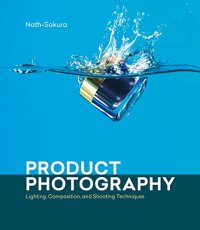
Ebook: Product Photography: Lighting, Composition, and Shooting Techniques
Author: Nath-Sakura
- Genre: Art // Photo
- Year: 2022
- Publisher: Rocky Nook
- Language: English
- mobi
Whether you’re photographing a bottle of wine or a painting, a pair of shoes or a piece of jewelry, successful product photography first requires a thorough knowledge of light. You need to fully understand how light works—angles, reflectance, quantity, quality, shadows, and more—as well as how it interacts with the materials, shapes, surfaces, and textures you’re photographing. Once you know where to place the light and how to shape it, along with key compositional and photographic techniques, you can create beautiful photographs of any product or object you encounter.
Of all the photographic genres, product photography requires the most precision, a consistent workflow, and a deep knowledge of optics. While this may seem daunting, anyone can learn to take great product photographs with photographer Nath-Sakura’s Product Photography: Lighting, Composition, and Shooting Techniques. Filled with inspiring and beautiful imagery, this book features a wide variety of products with diverse characteristics that will help you learn to tackle any challenge. Is the material glass, metal, liquid, plastic, or rubber? Is the surface’s finish shiny, reflective, dull, matte, or satin? Is the texture smooth, rough, or somewhere in between? Nath-Sakura addresses all of this and more.
As opposed to other “photo cookbooks” out there, this book dives deep into the essential concepts you need to know in order to gain a strong technical background for your work. Plus, alongside the text and final photographs are plentiful diagrams, behind-the-scenes shots, and lighting setups to help you on your journey to mastering product photography. Whether your images are destined for catalogs, magazines, advertising, or fine art applications, Product Photography equips you with what you need to know to create flawless product shots.
Table of Contents
Introduction
Part 1: The Laws of Optics and Light, and How to Use Them
Part 2: Volume, Texture, and Material
Part 3: Lighting and Practice
Part 4: Composition and Color
Part 5: Image Analysis and Lighting Setups